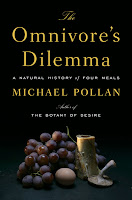
Michael Pollan, author of The Omnivore's Dilemma and Knight Professor of Science and Environmental Journalism at UC Berkeley spoke to the Berkeley Community on Wednesday evening about the “omnivore’s solution.” Pollan asks, “ What do we know about the links between what we eat and our own health? You can’t have a healthy diet without a healthy agriculture.” The problem is that when it comes to choosing what to eat, he says, “we are lost.”
Pollan began by unloading a few plastic Safeway bags of goodies that included Twinkies, Froot Loops, nutrition bars, and whole wheat Wonder Bread; products he argues are not food, but rather “edible food-like substances.” Needless to say, by the end of his presentation, he had most of the audience convinced as well.
But if these products do not constitute real food, what is real food anyway? And how do we eat healthfully without falling victim to one fad diet or another? Pollan addresses this with four basic rules: 1. If your grandma and/or great grandmother would not recognize it as food, it is not food. 2. If it has more than five ingredients it is not food. 3. Avoid any food you have ever seen advertised on television 4. Stop eating before you are full.
Pollan provides much background for how we got to this point of confusion with food in the first place. He asks, for instance, how does America, whose population worries about dietary health more than any other country in the world, also have the worst dietary health in the word. He argues that one of the greatest culprits is nutritionism, a concept in which “the key to understanding any food is the nutrients it contains.” With nutritionism, we suddenly need experts to tell us what to eat, and nutrients are divided into good and evil nutrients. Processed foods, then, have an edge over natural foods because they can alter their nutritional content. This creates a confusion in which people may eat foods higher in sugar because they are lower in fat, or vice versa, and have health problems all the same.
To resolve this dilemma, Pollan says, people need to reevaluate not just how they eat but why they eat. This will include returning to the diet and lifestyles of our ancestors who ate not just for health, but also for “community, pleasure and social identity.” People need to leave the packaged, processed foods of their supermarkets in favor of fresh produce from local farmers markets. Pollan argues that individual health, community health, and environmental health are all interrelated. What is best for our personal health is also best for our agriculture and the climate. He urges people to vote with their forks, or “food dollars”.
Pollan sums up his dietary advice with his famous, seven-word mantra: “eat food, not to much, mostly plants.”
photo from michaelpollan.com




Meh, I'm not so picky about my food, even if Pollan doesn't consider it real food.
ReplyDeleteI read that book over the summer (it was mailed out to all L&S students) and it was a good read.
ReplyDeleteWhile it is important to eat fresh and locally, that is still a luxury for many people given that buying local organic produce is not only (most of the time) more expensive but also more time-consuming, since (for example) instead of making one stop at Safeway one may need to stop at the farmer's market, the fishmonger's *and* the butchers (three stops). It is also frequently cheaper to buy processed foods than fresh ones; I can get a gallon of orange juice made from concentrate for a lot less than if I purchased and squeezed said juice myself, and this is not even factoring in the time. So while Pollan's advice may be sensible on paper they're just not possible to apply to our society at large as it stands now, which would be the real issue. Those who can afford to will listen to the press, eat healthy and buy fresh etc., but that doesn't solve the main problem which is that the masses simply do not have the resources to.